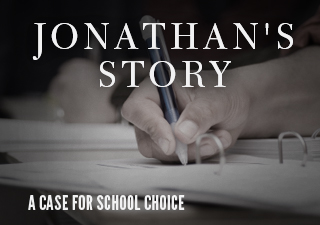Commentary

Parents Need Choices & Control of Their Children’s Education
Before Jonathan came to City Center Academy in Philadelphia, he was a “trouble student.” He hated school and was a constant distraction to the class. He got into a lot of fights and didn’t have many friends. But thanks to a scholarship through Pennsylvania’s Educational Improvement Tax Credit program, Jonathan was able to attend a school of his parents’ choice. The story of Jonathan is real—so are his problems, before school choice came into his life.
According to Jonathan, one of the greatest things about CCA is that it’s like a family. Because of the small classes, he got to know his classmates well and take the time to understand where they’re coming from in life. He learned how to get along with everyone because of the example his teachers set. “Before, I felt neglected by my teachers, but at CCA my teachers give me options; I can talk to them whenever I have a problem and they guide me along the way.”
Jonathan’s story is that of tens of thousands of students across the commonwealth. Almost 40,000 students used an EITC scholarship last year—with an average value of $1,000—to attend a better or safer school. The average annual family income for these students was only $29,000.
Unfortunately, hundreds of thousands of low-income parents in Pennsylvania don’t have this opportunity, and are forced to send their children to a low-performing public school based on their address. For too long parents without the financial means to change their address in order to change their child’s school have been held captive by a school system that often fails to prepare students for success.
These parents have been eagerly awaiting the day when Harrisburg will finally hear their cries for help and decide to change the system, giving them back control over their children’s educational futures.
In response, Senators Jeffrey Piccola (R-Dauphin, York) and Anthony Williams (D-Philadelphia, Delaware) recently introduced Senate Bill 1, The Opportunity Scholarship Act, which would expand the EITC by $25 million and create a voucher program for low-income students. Scholarships would be reserved for students in failing schools for the first two years, and then expanded to all low-income students across the state. Students would be able to take these scholarships to private schools or to schools in other districts.
Increasing educational opportunities will help improve student performance. Over the last two decades, 9 out of 10 random assignment studies of voucher students showed gains in academic achievement by voucher recipients; no such study has ever shown negative effects.
Reports from the U.S. Department of Education observed that students who participated in the D.C. voucher program gained the equivalent of an additional 3.7 months worth of reading achievement each year and were 21 percent more likely to graduate than their peers in public schools.
A recently released review of Milwaukee’s school choice program found that not only do scholarship students graduate at a higher rate than district students, but both scholarship recipients and public schools have dramatically increased graduation rates since the creation of the voucher program.
Not only do alternative education programs improve student performance, but they also save taxpayers money. Vouchers and EITC scholarships educate children for substantially less than the $13,000 per-pupil spent by Pennsylvania school districts.
Indeed, taxpayer funding for Pennsylvania public schools increased to over $25 billion in 2009, and staffing grew while enrollment declined. Despite this infusion of funds, Pennsylvania’s performance on the National Assessment of Education Progress (NAEP) exam has remained relatively unchanged, and Pennsylvania ranks among the worst states in SAT scores. Clearly, more spending is not solving our educational problems.
In defense of the status quo, Wythe Keever, spokesman for the Pennsylvania State Education Association, told the Pittsburgh Tribune-Review:
If you look at test scores in private and public schools and adjust for things like student characteristics, public school students perform just about as well.
In other words, despite spending three to five times the cost of vouchers, and 13 times the average value of scholarships provided by the EITC, public schools are performing worse than schools of choice.
Now is the time to end assigning students to a school based on their zip code. Now is the time to give tens of thousands of Pennsylvania parents control over their children’s educational futures-like Jonathan had in finding the right school for his needs. Pennsylvania needs real school choice now.
# # #
Nathan Benefield is Director of Policy Research and Andrew LeFevre is a Senior Fellow with the Commonwealth Foundation (CommonwealthFoundation.org), an independent, nonprofit public policy research and educational institute based in Harrisburg.